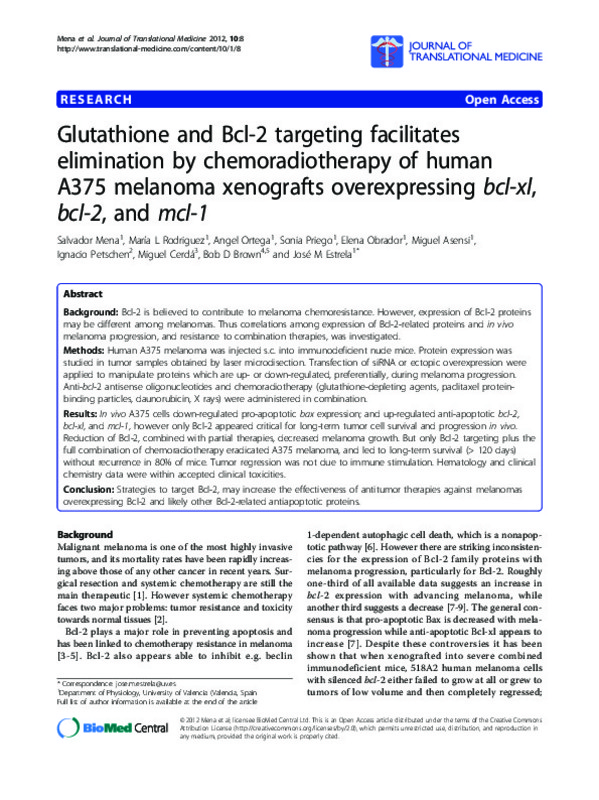JavaScript is disabled for your browser. Some features of this site may not work without it.
Buscar en RiuNet
Listar
Mi cuenta
Estadísticas
Ayuda RiuNet
Admin. UPV
Glutathione and Bcl-2 targeting facilitates elimination by chemoradiotherapy of human A375 melanoma xenografts overexpressing bcl-xl, bcl-2, and mcl-1
Mostrar el registro sencillo del ítem
Ficheros en el ítem
| dc.contributor.author | Mena-Mollá, Salvador
|
es_ES |
| dc.contributor.author | Rodríguez, Maria L.
|
es_ES |
| dc.contributor.author | Ortega, Ángel
|
es_ES |
| dc.contributor.author | Priego, Sonia
|
es_ES |
| dc.contributor.author | Obrador, Elena
|
es_ES |
| dc.contributor.author | Asensi, Miguel
|
es_ES |
| dc.contributor.author | Petschen, Ignacio
|
es_ES |
| dc.contributor.author | Cerda, Miguel
|
es_ES |
| dc.contributor.author | Brown, Bob D.
|
es_ES |
| dc.contributor.author | Estrela, Jose M.
|
es_ES |
| dc.date.accessioned | 2017-05-18T07:08:52Z | |
| dc.date.available | 2017-05-18T07:08:52Z | |
| dc.date.issued | 2012-01-10 | |
| dc.identifier.issn | 1479-5876 | |
| dc.identifier.uri | http://hdl.handle.net/10251/81329 | |
| dc.description.abstract | [EN] Background: Bcl-2 is believed to contribute to melanoma chemoresistance. However, expression of Bcl-2 proteins may be different among melanomas. Thus correlations among expression of Bcl-2-related proteins and in vivo melanoma progression, and resistance to combination therapies, was investigated. Methods: Human A375 melanoma was injected s.c. into immunodeficient nude mice. Protein expression was studied in tumor samples obtained by laser microdisection. Transfection of siRNA or ectopic overexpression were applied to manipulate proteins which are up- or down-regulated, preferentially, during melanoma progression. Anti-bcl-2 antisense oligonucleotides and chemoradiotherapy (glutathione-depleting agents, paclitaxel protein-binding particles, daunorubicin, X rays) were administered in combination. Results: In vivo A375 cells down-regulated pro-apoptotic bax expression; and up-regulated anti-apoptotic bcl-2, bcl-xl, and mcl-1, however only Bcl-2 appeared critical for long-term tumor cell survival and progression in vivo. Reduction of Bcl-2, combined with partial therapies, decreased melanoma growth. But only Bcl-2 targeting plus the full combination of chemoradiotherapy eradicated A375 melanoma, and led to long-term survival (> 120 days) without recurrence in 80% of mice. Tumor regression was not due to immune stimulation. Hematology and clinical chemistry data were within accepted clinical toxicities. Conclusion: Strategies to target Bcl-2, may increase the effectiveness of antitumor therapies against melanomas overexpressing Bcl-2 and likely other Bcl-2-related antiapoptotic proteins. | es_ES |
| dc.description.sponsorship | This research was supported by grants from the MICINN (SAF2009-07729 and IPT-010000-2010-21), Spain. M.L. Rodriguez held a fellowship from the MICINN. | |
| dc.language | Inglés | es_ES |
| dc.publisher | BioMed Central | es_ES |
| dc.relation.ispartof | Journal of Translational Medicine | es_ES |
| dc.rights | Reserva de todos los derechos | es_ES |
| dc.subject | B16 melanoma | es_ES |
| dc.subject | Cancer therapy | es_ES |
| dc.subject | Metastatic melanoma | es_ES |
| dc.subject | Antisense BCL-2 | es_ES |
| dc.subject | In vitro | es_ES |
| dc.subject | Cells | es_ES |
| dc.subject | Mouse | es_ES |
| dc.subject | Endothelium | es_ES |
| dc.subject | Proteins | es_ES |
| dc.subject | Family | es_ES |
| dc.title | Glutathione and Bcl-2 targeting facilitates elimination by chemoradiotherapy of human A375 melanoma xenografts overexpressing bcl-xl, bcl-2, and mcl-1 | es_ES |
| dc.type | Artículo | es_ES |
| dc.identifier.doi | 10.1186/1479-5876-10-8 | |
| dc.relation.projectID | info:eu-repo/grantAgreement/MICINN//SAF2009-07729/ES/Terapia Anti-Bcl-2 Y Deplecion De Gsh: Sensibilizacion Del Melanoma Maligno Humano A La Quimioradioterapia/ | es_ES |
| dc.relation.projectID | info:eu-repo/grantAgreement/MICINN//IPT-010000-2010-021/ES/NANOCOMPLEJOS DE ARN SINTETICO COMO NUEVA TERAPIA CONTRA CÁNCERES AGRESIVOS PARA LOS QUE NO SE DISPONE DE TRATAMIENTO EFECTIVO/ | |
| dc.rights.accessRights | Abierto | es_ES |
| dc.contributor.affiliation | Universitat Politècnica de València. Instituto de Reconocimiento Molecular y Desarrollo Tecnológico - Institut de Reconeixement Molecular i Desenvolupament Tecnològic | es_ES |
| dc.description.bibliographicCitation | Mena-Mollá, S.; Rodríguez, ML.; Ortega, Á.; Priego, S.; Obrador, E.; Asensi, M.; Petschen, I.... (2012). Glutathione and Bcl-2 targeting facilitates elimination by chemoradiotherapy of human A375 melanoma xenografts overexpressing bcl-xl, bcl-2, and mcl-1. Journal of Translational Medicine. 10:1-13. https://doi.org/10.1186/1479-5876-10-8 | es_ES |
| dc.description.accrualMethod | S | es_ES |
| dc.relation.publisherversion | http://doi.org/10.1186/1479-5876-10-8 | es_ES |
| dc.description.upvformatpinicio | 1 | es_ES |
| dc.description.upvformatpfin | 13 | es_ES |
| dc.type.version | info:eu-repo/semantics/publishedVersion | es_ES |
| dc.description.volume | 10 | es_ES |
| dc.relation.senia | 262714 | es_ES |
| dc.identifier.pmid | 22233801 | en_EN |
| dc.identifier.pmcid | PMC3268086 | |
| dc.contributor.funder | Ministerio de Ciencia e Innovación |








